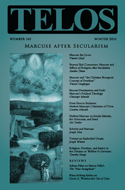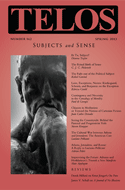By Vincent Lloyd · Thursday, February 13, 2014 Vincent Lloyd’s “Marcuse the Lover” appears in Telos 165 (Winter 2013). Read the full version online at the Telos Online website, or purchase a print copy of the issue in our store.
 Why has Marcuse’s fame faded? I argue that the answer has to do with the way secularism and critical theory do and do not interact in the contemporary academy. We can read Marcuse as a critic of secularism, when secularism is understood as one of the ideas of the ruling class, taking its current form with the rise of identity politics in the 1960s and 70s. Marcuse criticizes the secularizing features of the Protestant Reformation, much like other recent critics of secularism. Further, he seeks to recover a deeper sense of freedom—what might be called a post-secular sense of freedom. In doing so, he appeals to the good, the true, the beautiful, and, in a way, to rightly ordered love. I read Marcuse fundamentally as a critic of idolatry, as a negative political theologian. His work suggests a promising path for conversations about critical theory and secularism to come together. Why has Marcuse’s fame faded? I argue that the answer has to do with the way secularism and critical theory do and do not interact in the contemporary academy. We can read Marcuse as a critic of secularism, when secularism is understood as one of the ideas of the ruling class, taking its current form with the rise of identity politics in the 1960s and 70s. Marcuse criticizes the secularizing features of the Protestant Reformation, much like other recent critics of secularism. Further, he seeks to recover a deeper sense of freedom—what might be called a post-secular sense of freedom. In doing so, he appeals to the good, the true, the beautiful, and, in a way, to rightly ordered love. I read Marcuse fundamentally as a critic of idolatry, as a negative political theologian. His work suggests a promising path for conversations about critical theory and secularism to come together.
Continue reading →
By Telos Press · Monday, December 2, 2013  Telos Press is pleased to announce the publication of Ernst Jünger’s The Forest Passage, now available for purchase in our online store. Expertly translated by Thomas Friese, who previously translated Jünger’s The Adventurous Heart, and with an introduction by Russell A. Berman, this key text from Jünger’s oeuvre is finally accessible to English-language readers. Telos Press is pleased to announce the publication of Ernst Jünger’s The Forest Passage, now available for purchase in our online store. Expertly translated by Thomas Friese, who previously translated Jünger’s The Adventurous Heart, and with an introduction by Russell A. Berman, this key text from Jünger’s oeuvre is finally accessible to English-language readers.
Continue reading →
By Luciano Pellicani · Thursday, April 4, 2013 Luciano Pellicani ‘s “The Cultural War between Athens and Jerusalem: The American Case” appears in Telos 162 (Spring 2013). Read the full version online at the Telos Online website, or purchase a print copy of the issue in our store.
 Despite what Harold Berman claimed, the writers of the American Constitution were not inspired by strong religious convictions. On the contrary, as typical men of the Enlightenment they were severe critics of Christianity, considering it an obscurantist and intolerant tradition in all its versions. Hence their cultural battle to achieve the institutionalization of what Thomas Jefferson called “the wall of separation between State and Church” that would guarantee the greatest religious freedom. A freedom that was periodically threatened by fundamentalist movements which, in the name of Jerusalem, sought—and still seek—to establish a confessional state governed by the truth revealed in the Bible whereas the founding fathers hoped that “what Athens was in miniature, America will be in magnitude.” It is not true that America was born modern and progressive, as Ernest Gellner has maintained. It became so through the cultural war between Athens and Jerusalem that began in the eighteenth century and is still in progress. Despite what Harold Berman claimed, the writers of the American Constitution were not inspired by strong religious convictions. On the contrary, as typical men of the Enlightenment they were severe critics of Christianity, considering it an obscurantist and intolerant tradition in all its versions. Hence their cultural battle to achieve the institutionalization of what Thomas Jefferson called “the wall of separation between State and Church” that would guarantee the greatest religious freedom. A freedom that was periodically threatened by fundamentalist movements which, in the name of Jerusalem, sought—and still seek—to establish a confessional state governed by the truth revealed in the Bible whereas the founding fathers hoped that “what Athens was in miniature, America will be in magnitude.” It is not true that America was born modern and progressive, as Ernest Gellner has maintained. It became so through the cultural war between Athens and Jerusalem that began in the eighteenth century and is still in progress.
Continue reading →
|
|
 Why has Marcuse’s fame faded? I argue that the answer has to do with the way secularism and critical theory do and do not interact in the contemporary academy. We can read Marcuse as a critic of secularism, when secularism is understood as one of the ideas of the ruling class, taking its current form with the rise of identity politics in the 1960s and 70s. Marcuse criticizes the secularizing features of the Protestant Reformation, much like other recent critics of secularism. Further, he seeks to recover a deeper sense of freedom—what might be called a post-secular sense of freedom. In doing so, he appeals to the good, the true, the beautiful, and, in a way, to rightly ordered love. I read Marcuse fundamentally as a critic of idolatry, as a negative political theologian. His work suggests a promising path for conversations about critical theory and secularism to come together.
Why has Marcuse’s fame faded? I argue that the answer has to do with the way secularism and critical theory do and do not interact in the contemporary academy. We can read Marcuse as a critic of secularism, when secularism is understood as one of the ideas of the ruling class, taking its current form with the rise of identity politics in the 1960s and 70s. Marcuse criticizes the secularizing features of the Protestant Reformation, much like other recent critics of secularism. Further, he seeks to recover a deeper sense of freedom—what might be called a post-secular sense of freedom. In doing so, he appeals to the good, the true, the beautiful, and, in a way, to rightly ordered love. I read Marcuse fundamentally as a critic of idolatry, as a negative political theologian. His work suggests a promising path for conversations about critical theory and secularism to come together.  Telos Press is pleased to announce the publication of Ernst Jünger’s The Forest Passage, now available for purchase in our
Telos Press is pleased to announce the publication of Ernst Jünger’s The Forest Passage, now available for purchase in our  Despite what Harold Berman claimed, the writers of the American Constitution were not inspired by strong religious convictions. On the contrary, as typical men of the Enlightenment they were severe critics of Christianity, considering it an obscurantist and intolerant tradition in all its versions. Hence their cultural battle to achieve the institutionalization of what Thomas Jefferson called “the wall of separation between State and Church” that would guarantee the greatest religious freedom. A freedom that was periodically threatened by fundamentalist movements which, in the name of Jerusalem, sought—and still seek—to establish a confessional state governed by the truth revealed in the Bible whereas the founding fathers hoped that “what Athens was in miniature, America will be in magnitude.” It is not true that America was born modern and progressive, as Ernest Gellner has maintained. It became so through the cultural war between Athens and Jerusalem that began in the eighteenth century and is still in progress.
Despite what Harold Berman claimed, the writers of the American Constitution were not inspired by strong religious convictions. On the contrary, as typical men of the Enlightenment they were severe critics of Christianity, considering it an obscurantist and intolerant tradition in all its versions. Hence their cultural battle to achieve the institutionalization of what Thomas Jefferson called “the wall of separation between State and Church” that would guarantee the greatest religious freedom. A freedom that was periodically threatened by fundamentalist movements which, in the name of Jerusalem, sought—and still seek—to establish a confessional state governed by the truth revealed in the Bible whereas the founding fathers hoped that “what Athens was in miniature, America will be in magnitude.” It is not true that America was born modern and progressive, as Ernest Gellner has maintained. It became so through the cultural war between Athens and Jerusalem that began in the eighteenth century and is still in progress. 

